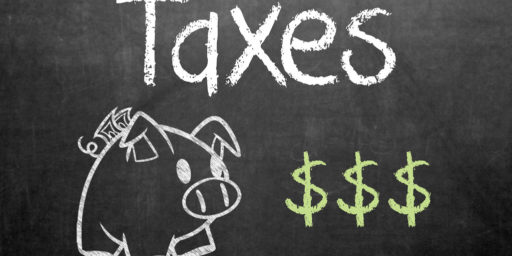Tax Cuts 101
Matthew Yglesias has a new column in TAP entitled, “Uppercuts” in which he “takes a look at the president’s desperate efforts to deny that only rich people will pay more in taxes if we raise taxes only on rich people, one of the more absurd efforts at dissimulation that we’ve seen to date.”
This is a lie wrapped in a distortion inside a fraud. Grant Bush his premise that the rich will evade Kerry’s tax hike through clever accounting tricks (a process in which they’ll surely be aided by Republican de-funding of the IRS tax enforcement apparatus and congressional pressure to direct what scrutiny remains at low-income filers) — even then, how does this mean “you pay?” It doesn’t. I make less than $200,000 per year, so if the only change to the tax code is a raise for folks who do, then I don’t pay. Whether or not those people evade their obligations has nothing to do with my tax bill.
Or grant Bush his premise that what Kerry really wants to do is raise taxes on small business and “the farmers and ranchers.” Does that mean you pay? Well, if you own a small business, a farm, or a ranch I suppose it does. But do you? Most people don’t. Most work for the people who own small businesses, or for the people who own large ones, or for the government. They won’t pay, and unless there was something very odd about the audience for Bush’s speech, neither will the people he was talking to.
Businesses don’t “pay” taxes. As with any other expense, they pass it along to the consumer in the form of price increases. So, not only does the consumer pay more for the product, they also pay proportionately higher sales taxes. To the extent that the costs can’t be passed along in the form of higher prices–if, for example, there is a foreign made substitute available–then the company is less profitable and less able to hire workers. Or give workers pay raises. Or stay in business at all.
It works essentially the same way if one taxes the income of very high earners. If a CEO’s salary is effectively reduced by, say, 10% because of a tax increase, then he is going to demand a commensurate increase in salary to restore him to the living standard that he negotiated in the first place. That additional cost of doing business will likewise be passed on to the customer.






This talk of “tax the rich” also overlooks the tragic fact of life that sole proprietors, who are responsible for creating the vast majority of jobs, are taxed on the income of their businesses, not on their own actual personal income.
Mr. Yglesias will have a more credible outlook if he will take this fact into account. Or perhaps he’s one of those rare men whose paycheck is signed by a poor guy.
Now, just a minute there!
What about the glorious “invisible hand” of efficient markets? If a CEO raises prices essentially just to feather his nest, doesn’t that mean some ambitious company whose CEO decides he can get by on a bit less will steal the business?
Also, I firmly agree with McGehee above; the only tax breaks to the “rich” I favor are corporate taxes on small-cap companies (particularly mom&pop sole-proprietorships), where those taxes can really make a difference. Where a very small increase in taxes to mid- and large-cap businesses can generate very large tax revenue without significantly affecting their business, the same percentage increase in small businesses can make or kill them.
It’s difficult to believe that rational people believe that lowering income taxes for the very wealthy can have much of an effect on the economy. They tend to buy luxury items or simply save the money; the investments they make aren’t mom&pop SP’s. Any tax discussion which doesn’t focus on encouraging very small business and startups isn’t really about employment or the economy.